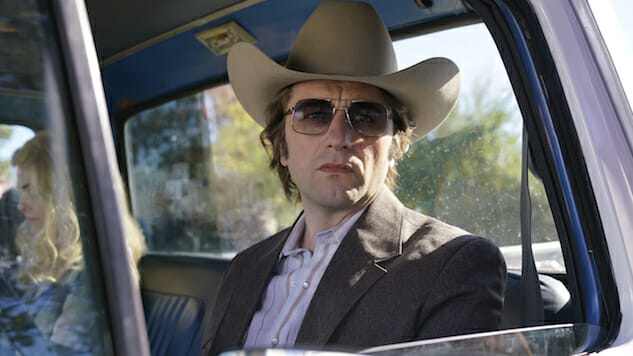The Americans: “The Midges” Is a Desolate, Surprising Masterpiece
(Episode 5.03)
Patrick Harbron/FX
The cue’s so cunning I smiled to myself, despite the dreadful act: As Philip and Elizabeth (Matthew Rhys and Keri Russell) clean the crime scene they’ve created on their Oklahoma jaunt, polishing the place where the researcher’s head met the glass and carrying away his corpse, Roxy Music’s “More Than This” rises on the soundtrack. It’s another moment, as I wrote of “Pests,” in which expectation and execution part, but if the song’s pop complexion seems strange so soon after the snap of the lab tech’s neck, its refrain suggests the desolate axis around which “The Midges” turns. Recalling Mad Men’s pungent use of Peggy Lee’s “Is That All There Is?” The Americans supplies an answer, working through the unutterable notion that this long, cold war is without purpose. “More than this, there is nothing,” the lyrics insist, and with its first-rate final sequence, the episode edges the series ever closer to assent.
“Compared to this, Matthew Beeman won’t seem so important,” as Philip says in the opening stages, convinced that telling Paige (Holly Taylor) about the crop operation will finally break the spell. “This,” of course, is the threat the pests pose to Soviet foodstuffs, and thus to the populace; urged on by memories of desperate hunger, he and Elizabeth see their mission as a humanitarian initiative, protecting their people from famine. After returning home from bowling with Tuan (Ivan Mok) and the Morozovs—an evening that underscores the personal nature of political persuasion, what with Alexei (Alexander Sokovikov) describing his father’s imprisonment in a Siberian gulag, and Tuan ruing the American destruction of Vietnam—Philip and Elizabeth launch their conversation with Paige on a hopeful, even breezy note, similarly assured of the righteousness of their cause.
It’s a terrific sequence, marshaling The Americans’ delicate aesthetic to construct a telling family tableau: Philip and Elizabeth, partners in life and work, move in tandem from the couch to the kitchen, picking up plates and depositing them in the sink; Paige, framed separately, poses her questions at a slight remove, still wary of her parents’ penchant for deception. By the time the exchange reaches its end, though, Paige has joined Philip and Elizabeth at the island, nearer the answers she seeks both literally and figuratively. “Is it hard, pretending to be other people?” she asks. “Yeah,” Philip says, finishing the exchange on a frank and trusting note. “Sometimes it’s really hard.”
-

-

-

-

-

-

-

-

-

-

-

-

-

-

-

-

-

-

-

-

-

-

-

-

-

-

-

-

-

-

-

-

-

-

-

-

-

-

-

-








































